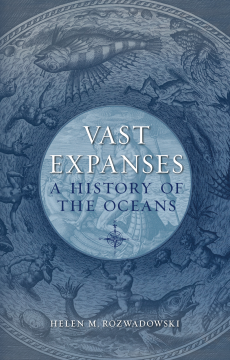
Additional Information
Book Details
Abstract
Much of human experience can be distilled to saltwater: tears, sweat, and an enduring connection to the sea. In Vast Expanses, Helen M. Rozwadowski weaves a cultural, environmental, and geopolitical history of that relationship, a journey of tides and titanic forces reaching around the globe and across geological and evolutionary time.
Our ancient connections with the sea have developed and multiplied through industrialization and globalization, a trajectory that runs counter to Western depictions of the ocean as a place remote from and immune to human influence. Rozwadowski argues that knowledge about the oceans—created through work and play, scientific investigation, and also through human ambitions for profiting from the sea—has played a central role in defining our relationship with this vast, trackless, and opaque place. It has helped us to exploit marine resources, control ocean space, extend imperial or national power, and attempt to refashion the sea into a more tractable arena for human activity.
But while deepening knowledge of the ocean has animated and strengthened connections between people and the world’s seas, to understand this history we must address questions of how, by whom, and why knowledge of the ocean was created and used—and how we create and use this knowledge today. Only then can we can forge a healthier relationship with our future sea.
“Vast Expanses is thought-provoking, intelligent, entertaining, and yet still compact. It could be read in a graduate seminar or on a beach holiday. Rozwadowski has written a great book on an important subject, and it is anything but a dry history!”
— Kurk Dorsey, University of New Hampshire and author of "Whales and Nations: Environmental Diplomacy on the High Seas"
"Rozwadowski presents a timely and useful oceancentric natural history of the ocean-human relationship. Human understanding of the oceans, which cover much of the surface of the earth, is historically weak. Rarely curious about the waters from which life on earth rose, humans have long exploited the seas for food, transport, mining, recreation, and war. Until recently, it was assumed that ocean resources were inexhaustible, especially the bounty of fish and marine mammals, and that garbage and chemical waste dumped into oceans would just disappear. The idea that burning fossil fuels could raise ocean temperatures was unthinkable. Some forward-thinking individuals recognized warning signs centuries ago, but marine business and industry continued and grew with the exploding world population. Much bad science continued to support uncontrolled exploitation of the seas, even after the rise of the ecological movement of the latter half of the twentieth century. Rozwadowski thoroughly brings readers up-to-date on these essential issues of marine exploration and research and the environment."
— Booklist
2019
— Winner of the Sharon Harris Book Award
Founder of the University of Connecticut’s Maritime Studies Program, Helen M. Rozwadowski teaches history of science, environmental history, and public history as well as interdisciplinary and experiential maritime-related courses. She is the author of Fathoming the Ocean: The Discovery and Exploration of the Deep Sea and coeditor of Soundings and Crossings: Doing Science at Sea 1800–1970.
Table of Contents
| Section Title | Page | Action | Price |
|---|---|---|---|
| Cover | Cover | ||
| Title Page | 3 | ||
| Imprint Page | 4 | ||
| Contents | 5 | ||
| Introduction: People and Oceans | 7 | ||
| 1: A Long Sea Story | 13 | ||
| 2: Imagined Oceans | 38 | ||
| 3: Seas Connect | 71 | ||
| 4: Fathoming All the Ocean | 104 | ||
| 5: Industrial Ocean | 130 | ||
| 6: Ocean Frontier | 161 | ||
| 7: Accessible Ocean | 188 | ||
| Epilogue: Ocean as Archive, Sea as History | 214 | ||
| References | 229 | ||
| Bibliography | 235 | ||
| Acknowledgements | 249 | ||
| Photo Acknowledgements | 253 | ||
| Index | 255 |
